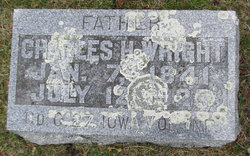From "Past and Present of Fayette County Iowa" (1910):
Charles H. Wright enjoyed limited advantages in the way of obtaining an education, his total schooling being confined to two winter terms of three months each. Later, however, he made up for this deficiency in a great measure by much reading and intelligent observation; his military experience also contributed to the development of his mental faculties, while the mingling with his fellow men in various business capacities has given him a valuable practical knowledge and made him one of the well informed men of his community.
"Wright remained at home, assisting with the cultivation of the farm, until August, 1862, when he exchanged the implements of husbandry for the death-dealing weapons of warfare. Enlisting on the 15th of that month in Company C, Twenty-seventh Iowa Volunteer Infantry, he spent some time at Dubuque drilling, thence accompanied his regiment to Fort Snelling, Minnesota, and later went via Prairie du Chien, Madison, Wisconsin, and Chicago, to Cairo, Illinois, where the command embarked for Memphis, Tennessee. Shortly after arriving at that city the Twenty-seventh joined Grant's army and the first duty that fell to the regiment was the guarding of the railroad bridge at Tallahassee, Georgia, subsequently being sent to Jackson, Tennessee, to guard the Jackson & Memphis railroad. In the summer of 1863 Mr. Wright's regiment was ordered to Helena, Arkansas, where it joined the forces under General Steel, which soon afterwards captured Little Rock. Returning to Memphis, the subject spent three months doing picket duty, which time extended into the winter of 1864, the coldest on record. During the months of December, January and February of that year the weather became so intensely severe that many soldiers had their hands and feet frozen while on duty, not a few being permanently disabled. In the spring of 1864 the Twenty-seventh Iowa was ordered to Vicksburg, where it joined the army under General Sherman and from there marched to Meridian, Mississippi, where many miles of railroad were destroyed and thirteen locomotives captured. Returning to Vicksburg, the regiment was detached from Sherman's command to form part of the force under General Banks for the Red River campaign. In the latter expedition Mr. Wright's regiment was in A. J. Smith's division and saw much active service, participating in a number of battles and skirmishes and experiencing its full share of the suffering and disaster which mark the history of that movement. Later the Twenty-seventh took part in the battle of Tupelo, Mississippi, after which it was ordered to join General Sherman at Atlanta, but the order being countermanded, the regiment with others went to St. Louis to head off the Confederate force under General Price, marching seven hundred and twenty miles without change of clothing and without much time to rest. The object being accomplished, the command went to Nashville to operate against General Hood, who was moving against that city, and in the bloody battle which occurred there and the similar engagement at Franklin the Twenty-seventh bore a conspicuous and gallant part. He accompanied his command though all of its experiences and vicissitudes at New Orleans, Dauphin Island, Spanish Fort, Fort Blakely and many other places. While on the ill-starred Red River campaign, he was shot through the right thigh, a painful and dangerous wound, but he recovered in due season and from that time until the close of the war.
"Mr. Wright was honorably discharged at Clinton, Iowa, August 8, 1865, after three years of service, after which he returned home and purchased a farm of one hundred and sixty acres near the family homestead, which he improved and on which he lived and prospered during the twenty-three years ensuing. At the expiration of that time he moved to Bremer county, where he bought land and farmed for a period of eleven years, disposing of his holding in that part of the state in 1900 and purchasing the beautiful place in Oran township, Fayette county, on which he has since resided. Mr. Wright's present farm consists of one hundred acres of highly improved and very valuable land.
From "Past and Present of Fayette County Iowa" (1910):
Charles H. Wright enjoyed limited advantages in the way of obtaining an education, his total schooling being confined to two winter terms of three months each. Later, however, he made up for this deficiency in a great measure by much reading and intelligent observation; his military experience also contributed to the development of his mental faculties, while the mingling with his fellow men in various business capacities has given him a valuable practical knowledge and made him one of the well informed men of his community.
"Wright remained at home, assisting with the cultivation of the farm, until August, 1862, when he exchanged the implements of husbandry for the death-dealing weapons of warfare. Enlisting on the 15th of that month in Company C, Twenty-seventh Iowa Volunteer Infantry, he spent some time at Dubuque drilling, thence accompanied his regiment to Fort Snelling, Minnesota, and later went via Prairie du Chien, Madison, Wisconsin, and Chicago, to Cairo, Illinois, where the command embarked for Memphis, Tennessee. Shortly after arriving at that city the Twenty-seventh joined Grant's army and the first duty that fell to the regiment was the guarding of the railroad bridge at Tallahassee, Georgia, subsequently being sent to Jackson, Tennessee, to guard the Jackson & Memphis railroad. In the summer of 1863 Mr. Wright's regiment was ordered to Helena, Arkansas, where it joined the forces under General Steel, which soon afterwards captured Little Rock. Returning to Memphis, the subject spent three months doing picket duty, which time extended into the winter of 1864, the coldest on record. During the months of December, January and February of that year the weather became so intensely severe that many soldiers had their hands and feet frozen while on duty, not a few being permanently disabled. In the spring of 1864 the Twenty-seventh Iowa was ordered to Vicksburg, where it joined the army under General Sherman and from there marched to Meridian, Mississippi, where many miles of railroad were destroyed and thirteen locomotives captured. Returning to Vicksburg, the regiment was detached from Sherman's command to form part of the force under General Banks for the Red River campaign. In the latter expedition Mr. Wright's regiment was in A. J. Smith's division and saw much active service, participating in a number of battles and skirmishes and experiencing its full share of the suffering and disaster which mark the history of that movement. Later the Twenty-seventh took part in the battle of Tupelo, Mississippi, after which it was ordered to join General Sherman at Atlanta, but the order being countermanded, the regiment with others went to St. Louis to head off the Confederate force under General Price, marching seven hundred and twenty miles without change of clothing and without much time to rest. The object being accomplished, the command went to Nashville to operate against General Hood, who was moving against that city, and in the bloody battle which occurred there and the similar engagement at Franklin the Twenty-seventh bore a conspicuous and gallant part. He accompanied his command though all of its experiences and vicissitudes at New Orleans, Dauphin Island, Spanish Fort, Fort Blakely and many other places. While on the ill-starred Red River campaign, he was shot through the right thigh, a painful and dangerous wound, but he recovered in due season and from that time until the close of the war.
"Mr. Wright was honorably discharged at Clinton, Iowa, August 8, 1865, after three years of service, after which he returned home and purchased a farm of one hundred and sixty acres near the family homestead, which he improved and on which he lived and prospered during the twenty-three years ensuing. At the expiration of that time he moved to Bremer county, where he bought land and farmed for a period of eleven years, disposing of his holding in that part of the state in 1900 and purchasing the beautiful place in Oran township, Fayette county, on which he has since resided. Mr. Wright's present farm consists of one hundred acres of highly improved and very valuable land.
Family Members
Sponsored by Ancestry
Advertisement
Explore more
Sponsored by Ancestry
Advertisement















